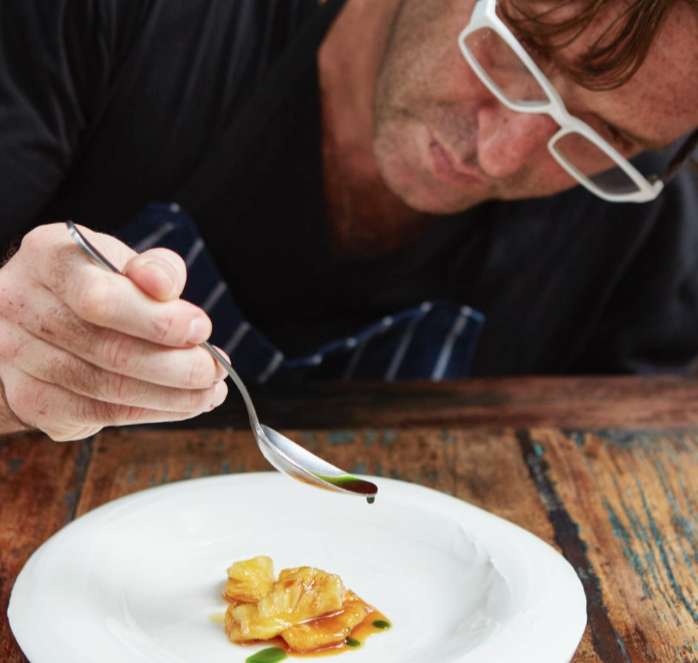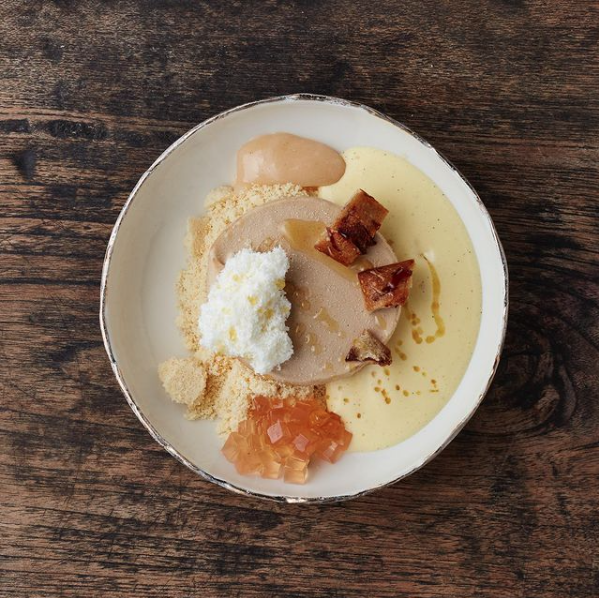TFN Talks with Will Goldfarb
TFN Talks recently had the pleasure of sitting down with Will Goldfarb, master pastry chef, author, the star of Netflix Chef’s Table Season Four - Pastry, and visionary behind Bali’s famous Room4Dessert, to talk about his extraordinary life and journey in the world of culinary arts.
What inspired you to take pastry to such a high level and what inspires you in how you design the presentation of each dessert? Is there an aspect of molecular gastronomy involved?
I am passionate about design. But first and foremost about flavor. I don’t think that the term molecular gastronomy, as commonly understood, is relevant to our creations. W/r/t molecular gastronomy, I think there is a big misconception about what it actually refers to, which has nothing to do with industrial ingredients and techniques, as it is misrepresented in the media. As defined originally, it merely attempts to verify the scientific basis behind traditional kitchen wisdom.
The exact quote from your episode of ‘Chef’s Table’ on Netflix was, “For a chef not to be able to get fresh fish would be considered ridiculous, but for a pastry chef to get fresh chocolate would never even be a thing”. How has living in Bali where fabulous cacao and other pastry ingredients are grown locally and having this access changed the way you create and experience pastry?
It has made everything that we do more delicious and relevant.
Basically being close to raw ingredients has changed everything. The entire calculus around being a pastry chef is typically about production. Production schedules; routines; reliability; consistency. For this reason the bulk of pastry products are produced in an effort to standardize production, streamline operations, and make flavor consistent across time and space.
Of course, these are precisely the opposite of characteristics that pastry cooks should be looking for, at least in regards to flavor. I want to be clear: We are all about consistency in regards to technique; the importance of following recipes (and learning how to make them); the importance of quality control; the etiquette of hygiene; and so on. But. The mass production of the basic commodities of pastry and food in general leave a lot to be desired when it comes to flavor, originality, understanding nature, understanding the seasons, developing relationships with growers, building seasonal menus, and of course, growing oneself. For this reason, the move to Bali was so critical to my evolution as a chef, because it put me in touch immediately with the products I had already been working with and dreaming about.
I can’t think of a single other location in the world where we would be able to do what we do and be so close to the product, the soul of pastry.
Where did your dream of being a pastry chef originate and when did you start pursuing it seriously? What was your training like?
I started as a savory cook, and moved into pastry so that the pastry chef could take a holiday. I continued my pastry studies in Paris, and then was placed in the pastry department at El Bulli under Albert Adria in 1999.
What are your best pieces of advice when it comes to being a pastry chef?
Be humble. Be patient. Share the love.
Be tidy. Be organized. Show up every day.
After attending Cordon Bleu in Paris you made multiple attempts to apply for work at El Bulli, one day finally succeeding and had consequently spent more than a year working at one of the world’s most renowned Michelin rated restaurants. Can you tell us how this came about and what was it like working there?
I was hiding in the office in Cibreo from the immigration authorities and I called the restaurant on the last day of the season - they were celebrating as it was the year that they received three Michelin stars - and they offered me a place!
Just before you made the move to Bali, you revived a cancer diagnosis. What did this experience teach you and how did it make you reflect on your life and career?
Being in a cancer ward with a lot of children reminds you never to feel sorry for yourself.
For many people rejection can be crippling, but you thrived. How did you move beyond people’s opinions and stay true to your own?
I tend to be pretty determined - I think rejection/response/recovery is a healthy part of growth.
What is the most gratifying part of being a pastry chef in Bali and do you ever miss the mad rush or the celebrity of New York City?
Getting to cook for so many amazing people every night is the best reward. I love NY but I don’t need to live there - although maybe one day we will go back to our original location if it ever becomes available...
I dropped by Will Goldfarb’s Room4Dessert in Ubud, Bali to try the famous Sugar Refinery. A true masterpiece.
What are the biggest challenges you have had to face in your life and career and how did you overcome them?
Losing my restaurant was the greatest professional challenge. I was lucky that I got a chance to try it again. I think that my career has been a series of challenges that I have had the privilege to continue to confront. From the beginning of my career, where I was told repeatedly that I was doomed to fail to the current situation where an entire industry is battling for survival, the theme of recovery and repair is essential, relevant, and continuous.
After training as a pastry chef and working my way through restaurants it became clear that there would be no similar opportunities presented to me as there would be to savory chefs - for this reason I was compelled to open Room4Dessert in New York in 2005. Dealing with the loss of this consumed me for the better part of a decade.
During this time I had the chance to battle with a pesky soft tissue cancer, and retain a bit of perspective on life. In recent years, my physical wellbeing has come more and more into sharp relief, leading to an emphasis on physical and emotional wellness. Of course Bali is the perfect place for that.
Most recently, the pandemic, but more appropriately the economic fallout from the pandemic has made the restaurant industry a kind of endangered species. The work that we have done this year to keep the restaurant going, and keep our staff employed, all the while cooking for Bali’s hungriest people… this has been the most challenging and most rewarding time of my career.
And we are not out of the woods yet. I am confident that the lessons we learned and priorities we set during this time will stick with us in years to come - to make sure that we are always focused on what is most important, ESPECIALLY when it is most difficult.
What do you think has kept you so grounded and in touch despite the extraordinary nature of your life and career and all the challenges you have persevered through?
I am just lucky to have such a loving and supportive family.
To quote you, “I think it’s more charming to take care of actual people then to make something in an abstract vacuum for your own ego. It’s easy to lose sight of that when you’re very self centered.” Do you feel that you are able to connect with your guests on a deeper level here in Bali than you did in New York? What feels different and how?
I am a lot older. :).
I’m not sure - I feel like we connected with our guests in New York on a pretty deep level - but there is no question that the space and time we are allowed here in Ubud have allowed us to provide a different and more mature type of luxury, without losing the same intimate connection that made the younger version of ourselves so welcoming. New York is a very media driven place, and I think that contributed to a certain disconnect between image and reality - but nowadays I think everyone is so connected through social media that people seem to be constantly obsessed with self image. I’m lucky to be old enough now to not worry about it too much - if these applications had been with me when I was a teenager I’m not sure I’d be able to resist the cool dopamine hit they provide so readily. At the same time, we have been lucky that people still come to our little dessert bar in the jungle. And we hope that we can make each person feel special, even if just for a few hours. I’m confident that Bali has helped me to mature and be better at taking care of people.
How do you spend your time outside of Room 4 Dessert? What would people be surprised to find out about you?
I am a very boring person outside of the restaurant. I like to go home and relax with my family.
Room4Dessert Ubud, Bali
‘TFN Talks’ In Partnership with Tropical Nomad Coworking Space




